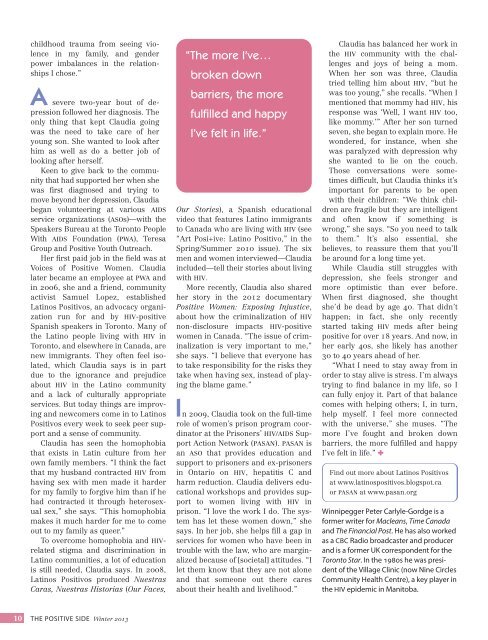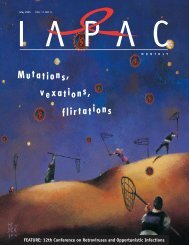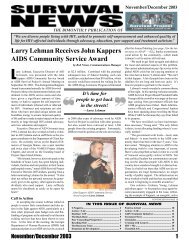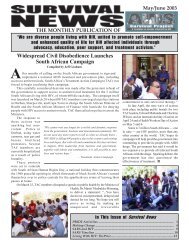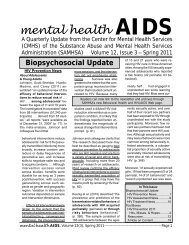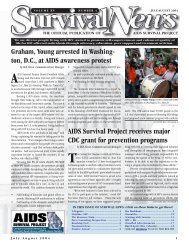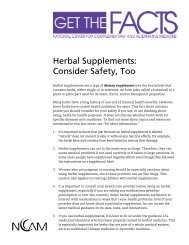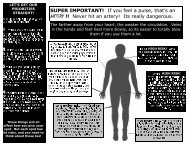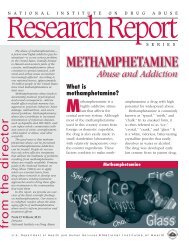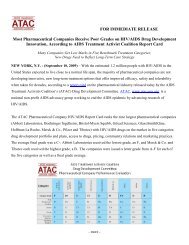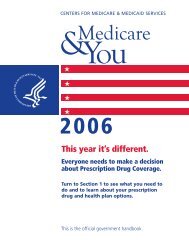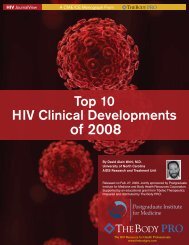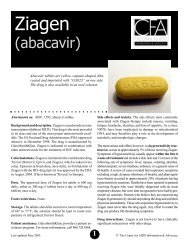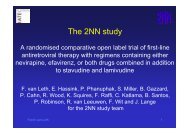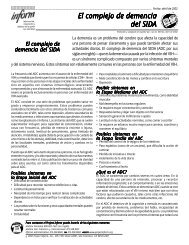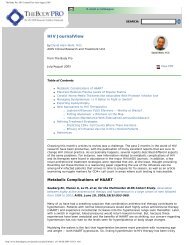The Positive Side (Winter 2013) - CD8 T cells - The Body
The Positive Side (Winter 2013) - CD8 T cells - The Body
The Positive Side (Winter 2013) - CD8 T cells - The Body
You also want an ePaper? Increase the reach of your titles
YUMPU automatically turns print PDFs into web optimized ePapers that Google loves.
childhood trauma from seeing violence<br />
in my family, and gender<br />
power imbalances in the relationships<br />
I chose.”<br />
A severe two-year bout of de -<br />
pression followed her diagnosis. <strong>The</strong><br />
only thing that kept Claudia going<br />
was the need to take care of her<br />
young son. She wanted to look after<br />
him as well as do a better job of<br />
looking after herself.<br />
Keen to give back to the community<br />
that had supported her when she<br />
was first diagnosed and trying to<br />
move beyond her depression, Claudia<br />
began volunteering at various AIDS<br />
service organizations (ASOs)—with the<br />
Speakers Bureau at the Toronto People<br />
With AIDS Foundation (PWA), Teresa<br />
Group and <strong>Positive</strong> Youth Outreach.<br />
Her first paid job in the field was at<br />
Voices of <strong>Positive</strong> Women. Claudia<br />
later became an employee at PWA and<br />
in 2006, she and a friend, community<br />
activist Samuel Lopez, established<br />
Latinos Positivos, an advocacy organization<br />
run for and by HIV-positive<br />
Spanish speakers in Toronto. Many of<br />
the Latino people living with HIV in<br />
Toronto, and elsewhere in Canada, are<br />
new immigrants. <strong>The</strong>y often feel isolated,<br />
which Claudia says is in part<br />
due to the ignorance and prejudice<br />
about HIV in the Latino community<br />
and a lack of culturally appropriate<br />
services. But today things are improving<br />
and newcomers come in to Latinos<br />
Positivos every week to seek peer support<br />
and a sense of community.<br />
Claudia has seen the homophobia<br />
that exists in Latin culture from her<br />
own family members. “I think the fact<br />
that my husband contracted HIV from<br />
having sex with men made it harder<br />
for my family to forgive him than if he<br />
had contracted it through heterosexual<br />
sex,” she says. “This homophobia<br />
makes it much harder for me to come<br />
out to my family as queer.”<br />
To overcome homophobia and HIVrelated<br />
stigma and discrimination in<br />
Latino communities, a lot of education<br />
is still needed, Claudia says. In 2008,<br />
Latinos Positivos produced Nuestras<br />
Caras, Nuestras Historias (Our Faces,<br />
10 THE POSITIVE SIDE <strong>Winter</strong> <strong>2013</strong><br />
“<strong>The</strong> more I’ve…<br />
broken down<br />
barriers, the more<br />
fulfilled and happy<br />
I’ve felt in life.”<br />
Our Stories), a Spanish educational<br />
video that features Latino immigrants<br />
to Canada who are living with HIV (see<br />
“Art Posi+ive: Latino Positivo,” in the<br />
Spring/Summer 2010 issue). <strong>The</strong> six<br />
men and women interviewed— Claudia<br />
included—tell their stories about living<br />
with HIV.<br />
More recently, Claudia also shared<br />
her story in the 2012 documentary<br />
<strong>Positive</strong> Women: Exposing Injustice,<br />
about how the criminalization of HIV<br />
non-disclosure impacts HIV-positive<br />
women in Canada. “<strong>The</strong> issue of criminalization<br />
is very important to me,”<br />
she says. “I believe that everyone has<br />
to take responsibility for the risks they<br />
take when having sex, instead of playing<br />
the blame game.”<br />
In 2009, Claudia took on the full-time<br />
role of women’s prison program coordinator<br />
at the Prisoners’ HIV/AIDS Support<br />
Action Network (PASAN). PASAN is<br />
an ASO that provides education and<br />
support to prisoners and ex-prisoners<br />
in Ontario on HIV, hepatitis C and<br />
harm reduction. Claudia delivers educational<br />
workshops and provides support<br />
to women living with HIV in<br />
prison. “I love the work I do. <strong>The</strong> system<br />
has let these women down,” she<br />
says. In her job, she helps fill a gap in<br />
services for women who have been in<br />
trouble with the law, who are marginalized<br />
because of [societal] attitudes. “I<br />
let them know that they are not alone<br />
and that someone out there cares<br />
about their health and livelihood.”<br />
Claudia has balanced her work in<br />
the HIV community with the challenges<br />
and joys of being a mom.<br />
When her son was three, Claudia<br />
tried telling him about HIV, “but he<br />
was too young,” she recalls. “When I<br />
mentioned that mommy had HIV, his<br />
response was ‘Well, I want HIV too,<br />
like mommy.’” After her son turned<br />
seven, she began to explain more. He<br />
wondered, for instance, when she<br />
was paralyzed with depression why<br />
she wanted to lie on the couch.<br />
Those conversations were sometimes<br />
difficult, but Claudia thinks it’s<br />
important for parents to be open<br />
with their children: “We think children<br />
are fragile but they are intelligent<br />
and often know if something is<br />
wrong,” she says. “So you need to talk<br />
to them.” It’s also essential, she<br />
believes, to reassure them that you’ll<br />
be around for a long time yet.<br />
While Claudia still struggles with<br />
depression, she feels stronger and<br />
more optimistic than ever before.<br />
When first diagnosed, she thought<br />
she’d be dead by age 40. That didn’t<br />
happen; in fact, she only recently<br />
started taking HIV meds after being<br />
positive for over 18 years. And now, in<br />
her early 40s, she likely has another<br />
30 to 40 years ahead of her.<br />
“What I need to stay away from in<br />
order to stay alive is stress. I’m always<br />
trying to find balance in my life, so I<br />
can fully enjoy it. Part of that balance<br />
comes with helping others; I, in turn,<br />
help myself. I feel more connected<br />
with the universe,” she muses. “<strong>The</strong><br />
more I’ve fought and broken down<br />
barriers, the more fulfilled and happy<br />
I’ve felt in life.” ✚<br />
Find out more about Latinos Positivos<br />
at www.latinospositivos.blogspot.ca<br />
or PASAN at www.pasan.org<br />
Winnipegger Peter Carlyle-Gordge is a<br />
former writer for Macleans, Time Canada<br />
and <strong>The</strong> Financial Post. He has also worked<br />
as a CBC Radio broadcaster and producer<br />
and is a former UK correspondent for the<br />
Toronto Star. In the 1980s he was president<br />
of the Village Clinic (now Nine Circles<br />
Community Health Centre), a key player in<br />
the HIV epidemic in Manitoba.


